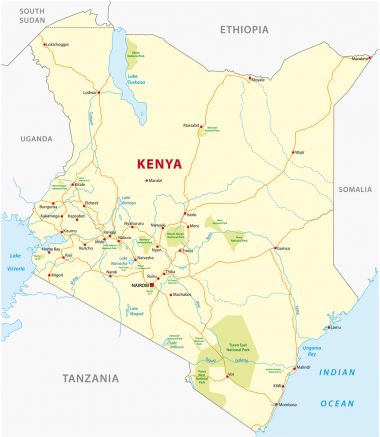As death toll mounts in Kenya church, local clergy wonder at scale of indoctrination

In an expansive forest near Kenya's southern coast, detectives have been exhuming bodies of people who starved to death to go to "heaven," allegedly at the orders of a Christian pastor.
Anger and shock gripped the East African nation as families learned Paul Mackenzie Nthenge, the leader of the Good News International Church, ordered members to pray and fast to death so they could meet Jesus. When the people died, Nthenge and other members reportedly buried their bodies in shallow graves in Shakahola, an 800-acre forest ranch near Malindi, a tourist town on the Indian Ocean.
"Shakahola" means "a place of treating people's problems," according to retired Anglican Bishop Julius Kalu of Mombasa, whose home is near the area. Kalu wonders if the place's meaning held a special appeal to Nthenge.
"When he bought the land in Shakahola, he told the people that he wanted to practice farming," Kalu told Religion News Service.
"It got us by surprise. I do not know where he got this kind of theology. Christians pray and fast, but they don't do it until their death," he said. "I think we could not detect it because most of the victims are people from upcountry. The area is also sparsely populated."
The death toll now stands at 90, with 26 new bodies exhumed on Monday from the mass graves in the ranch. Local teams anticipate more bodies in the ongoing search — the Kenyan Red Cross Society said on Sunday that 112 people had been reported missing to a tracing desk it set up near where the church was located — and Kenyans from different parts of the country have traveled to the area searching for their relatives.
Many are decrying the Good News International Church as a cult and calling Nthenge a cult leader.
"It's indeed a worrying trend to watch how many desperate and innocent Kenyans are being spiritually terrorized or swindled by multiple fake pastors and cultic leaders," said Roman Catholic Bishop Wilybard Kitogho Lagho of the Malindi Diocese on April 24. "What makes cultism a complicated phenomena to deal with is that cult followers believe their religious, sect or cult leader is always right, and their leader has the exclusive means of knowing 'truth.'"
The horrors began unfolding on April 14 when police raided the Nthenge compound on a tip that some people were starving to death there. They found 15 emaciated people, including four who later died. The survivors said they were following the pastor's instructions to starve in order to meet Jesus.
Kenya's President William Samoei Ruto described the incidents at the ranch as "akin to terrorism," saying terrorists use religion to advance their heinous acts.
"People like Mackenzie are using religion to do exactly that," said Ruto.
Religious leaders and human rights campaigners have criticized the pastor's actions as an abuse of Kenya's right to freedom of worship. Kenya is majority Christian: about 85% of the country's nearly 53 million population is Christian, while about 10% are Muslim.
"While the state remains respectful of religious freedom, the horrendous blight on the conscience must lead not only to the most severe punishment, but tighter regulation of every church, mosque, temple or synagogue going forward," said Kindiki Kithure, Kenya's Interior Cabinet secretary.
Most of the exhumed bodies have been children's, but the extreme indoctrination of their parents has shocked clerics and religious analysts. Many of them sold all their belongings or left good-paying jobs to join the pastor at the ranch. The promise was simple: "Come and meet Jesus and go to heaven."
Some scholars highlight the pastor's actions and teachings as an example of heretical Christian theology, a surging problem in Africa. Such practices arise out of Christian teachings but ignore the supremacy and sufficiency of Christ or challenge or misrepresent the divine sovereignty of God, notes the Rev. Gibson Ezekiel Lesmore, an official at the All Africa conference of Churches.
"It is an example of misleading theologies. However, it is also demonic. The pastor should be treated as a deadly criminal," said Lesmore.
Media reports describe Nthenge as a dynamic and charismatic speaker and an author of books on Christian living and spirituality. He started the church in Malindi in 2003. However, he was forced out of the town in 2015 after a controversy over the kind of religious teaching he was giving to children. It was then that he settled in the forest.
In November 2019, the pastor announced the closure of the church and his digital television station, saying the message God had given him was already delivered. In May the same year, at a magistrate's court in Malindi, he faced charges of disobeying the law, religious incitement and indoctrination of children. Earlier, he had been found with films that discouraged children from attending school. The films also incited the children against Hinduism, Buddhism and Islam. The court had released him on a Kenya Shilling 1 million bond with an alternative of 500,000 cash bail.
In 2017, police raided his church and rescued 93 children. He was arraigned in court on charges of radicalization and teaching in an unregistered school. The pastor denied the charges and was released on bond.
Nthenge demanded that his adherents stop sending their children to school and that they burn all academic certificates. He also banned women from shaving their hair and the sick from seeking treatment in hospitals. Church members were required to live on his ranch.
"We need to review the proposed state laws and amend them where necessary to ensure such rogue preachers are exposed and denied space for their dangerous activities," said Lagho.
© Religion News Service











